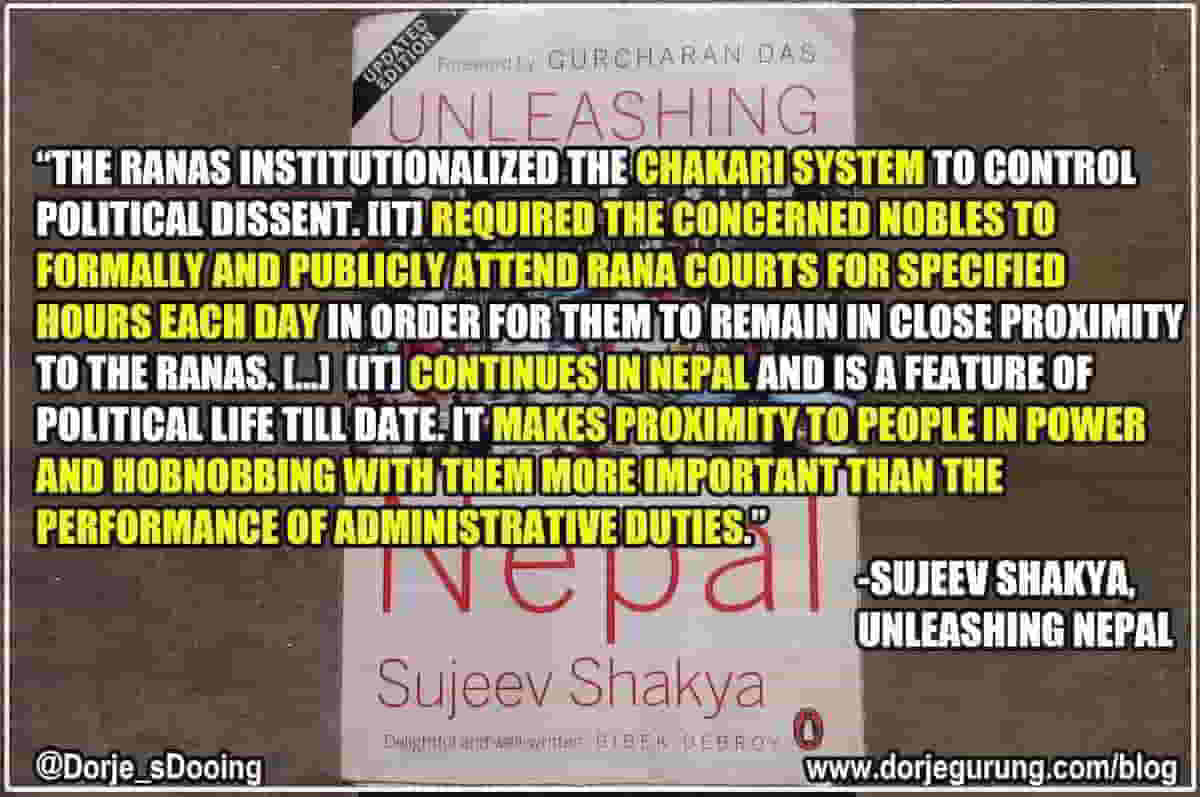
I have written about and/or made reference to the practice of ass-kissing, referred to in various blogs of mine as chakari garnu or chaplusi garnu. While ass-kissing and sycophancy happens all over the world, the way it’s practiced in Nepal is “highly developed” and peculiar.
In Travel: Small Talk…Nothing Biggie, I made a brief reference to it saying how I am handicapped because, having spent all my adult life abroad, I just didn’t know how to do it. Kissing Ass Could Mean Sitting On Your Asses was the first blog post on the topic. In “Do you board a plane wearing a helmet ?? Is that gonna guarantee your safety??? But you do it nonetheless”, I alluded to the fact that the practice hinders progress. In “Tell Me, Where is Ethnicity-based Discrimination in Nepal?!” I mentioned how cushy government jobs are obtained through ass-kissing, patronage and nepotism. And finally in UWC Scholarships, Nepotism and Conflict of Interest, how even high school graduates try to go through the same process to get a leg up on fellow scholarship applicants!
Reproduced below, with permission from the author, the section Institution of Chakari (pp. 28-29) from the book Unleashing Nepal by Sujeev Shakya. It provides a good history of how and why it all started during the 104-year hereditary Rana-family rule of the country between 1846 and 1951A.D.!
* * * * * * * *
Institution of Chakari
Dr. Ram Sharan Mahat in his book, In Defense of Democracy summarizes what he calls the Rana Shogunate, ‘The Rana political system was undisguised military despotism with absolute total control over all aspects of public life.’ The Ranas institutionalized the chakari system to control political dissent. The chakari system required the concerned nobles to formally and publicly attend the Rana courts for specified hours each day in order for them to remain in close proximity to the Ranas. This effectively controlled the movement and activities of potential troublemakers and conspirators. Furthermore, the practice of night time curfew rendered night time visits and activities impossible. The chakari system continues in Nepal and is a feature of political life till date. It makes proximity to people in power and hobnobbing with them more important than the performance of administrative duties. [Emphasis mine!]
The Ranas had for long tried to restrict education among the Nepali people. They saw in more widespread education, the seeds of their own downfall. Although they did establish a limited number of schools in Nepal, these were primarily meant to prevent Nepali youths from going to study in India. They also were tools for state propaganda and an attempt to ensure the loyalty of the educated class. This attempt has limited success, as the education in India was considered of much higher quality. As long as the British remained in India, the Rana regime remained strong in Nepal, but with a growing class of Nepali citizens studying and growing up in India due to educational restrictions in Nepal, a new class of Nepali citizens were forming. They were mostly upper class and upper caste landowning Hindus and the chuldren of those who had loyally served in the Rana bureaucracy. It was this class of citizens that both assisted the Indian National Congress in the its fight for independence and eventually fought against the Rana regime. in the 1940s. Anti-Rana sentiments were sometimes fostered within the Rana family itself, most particularly among lower ranking Ranas who were not benefiting from the rule the were publicly associated with.
Although anti-Rana movements started in Nepal as early as the 1920s, the most comprehensive attempt to challenge the regime came from the Nepali Congress, constituted by the exiled children of Rana bureaucrats — India-educated and heavily influenced by Nehru and Gandhi. The Nepali Congress grew out of one of the earliest anti-Rana movements, which was led by the Praja Parishad, a political party. A few members of the Praja Parishad were executed by the Rana rulers on charges of treason. The anger of the Nepali public about the execution only strengthened the opposition against the Rana regime. Surviving members of the Praja Parishad escaped to India and went on to establish the Nepali Congress in India, with the goal of establishing democracy in Nepal. Although initially propounding a non-violent movement following the way of Gandhi, the Nepali Congress was to take up ared struggles against the Rana regime from 1947 onwards. In this, they were supported by King Tribhuvan, who had been crowned as the tent Shah king of Nepal in 1911 at the age of five and had been actively involved in the Praja Parishad. He was strongly opposed to the regime of the Rana prime ministers and wished to restore the Shah dynasty to its previous glory.
In April 1950, the national congress lead by B. P. Koirala and the Rana dissidents, led by Suvarna Shumsher and Mahabir Shumsher, joined forces. This gave Kind Tribhuvan the impetus he needed to use pro-democratic forces to push his anti-Rana crusade, the eventual aim of which was to legitimize his own powers. This quest was further facilitated by an independent India which by policy, supported by the pro-democratic forces in Nepal. By 1951, as a result of these developments, the regime of the Rana prime ministers had fallen in Nepal, while Tibet had been annexed by the Chinese. Kind Tribhuvan had declared that a democratic government leading to a constituent assembly was to be established in Nepal. Under India’s tutelage, an interim constitution was drawn up and plans for a constituent assembly leading to the establishment of a formal constitution were drafted. These years formed the first few years of Nepal’s entrance upon the world stage and its first attempts at modernization towards an industrial society.
* * * * * * * *
What do you think?
